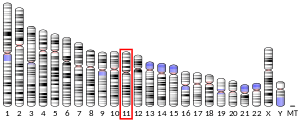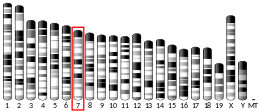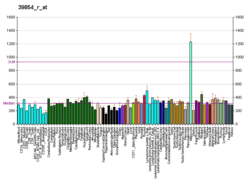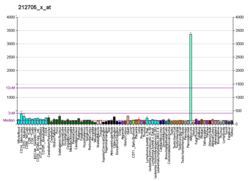Adipose triglyceride lipase
Adipose triglyceride lipase also known as patatin-like phospholipase domain-containing protein 2 is an enzyme that in humans is encoded by the PNPLA2 gene.[5][6][7][8]
References
- GRCh38: Ensembl release 89: ENSG00000177666 - Ensembl, May 2017
- GRCm38: Ensembl release 89: ENSMUSG00000025509 - Ensembl, May 2017
- "Human PubMed Reference:". National Center for Biotechnology Information, U.S. National Library of Medicine.
- "Mouse PubMed Reference:". National Center for Biotechnology Information, U.S. National Library of Medicine.
- Andersson B, Wentland MA, Ricafrente JY, Liu W, Gibbs RA (Jun 1996). "A "double adaptor" method for improved shotgun library construction". Anal Biochem. 236 (1): 107–13. doi:10.1006/abio.1996.0138. PMID 8619474.
- Wilson PA, Gardner SD, Lambie NM, Commans SA, Crowther DJ (Aug 2006). "Characterization of the human patatin-like phospholipase family". J Lipid Res. 47 (9): 1940–9. doi:10.1194/jlr.M600185-JLR200. PMID 16799181.
- Kienesberger PC, Oberer M, Lass A, Zechner R (Apr 2009). "Mammalian patatin domain containing proteins: a family with diverse lipolytic activities involved in multiple biological functions". J Lipid Res. 50 Suppl (Supplement): S63–8. doi:10.1194/jlr.R800082-JLR200. PMC 2674697. PMID 19029121.
- "Entrez Gene: PNPLA2 patatin-like phospholipase domain containing 2".
External links
- Human PNPLA2 genome location and PNPLA2 gene details page in the UCSC Genome Browser.
Further reading
- Yu W, Andersson B, Worley KC, et al. (1997). "Large-scale concatenation cDNA sequencing". Genome Res. 7 (4): 353–8. doi:10.1101/gr.7.4.353. PMC 139146. PMID 9110174.
- Strausberg RL, Feingold EA, Grouse LH, et al. (2003). "Generation and initial analysis of more than 15,000 full-length human and mouse cDNA sequences". Proc. Natl. Acad. Sci. U.S.A. 99 (26): 16899–903. doi:10.1073/pnas.242603899. PMC 139241. PMID 12477932.
- Colland F, Jacq X, Trouplin V, et al. (2004). "Functional proteomics mapping of a human signaling pathway". Genome Res. 14 (7): 1324–32. doi:10.1101/gr.2334104. PMC 442148. PMID 15231748.
- Villena JA, Roy S, Sarkadi-Nagy E, et al. (2004). "Desnutrin, an adipocyte gene encoding a novel patatin domain-containing protein, is induced by fasting and glucocorticoids: ectopic expression of desnutrin increases triglyceride hydrolysis". J. Biol. Chem. 279 (45): 47066–75. doi:10.1074/jbc.M403855200. PMID 15337759.
- Jenkins CM, Mancuso DJ, Yan W, et al. (2005). "Identification, cloning, expression, and purification of three novel human calcium-independent phospholipase A2 family members possessing triacylglycerol lipase and acylglycerol transacylase activities". J. Biol. Chem. 279 (47): 48968–75. doi:10.1074/jbc.M407841200. PMID 15364929.
- Zimmermann R, Strauss JG, Haemmerle G, et al. (2004). "Fat mobilization in adipose tissue is promoted by adipose triglyceride lipase". Science. 306 (5700): 1383–6. doi:10.1126/science.1100747. PMID 15550674.
- Rual JF, Venkatesan K, Hao T, et al. (2005). "Towards a proteome-scale map of the human protein-protein interaction network". Nature. 437 (7062): 1173–8. doi:10.1038/nature04209. PMID 16189514.
- Smirnova E, Goldberg EB, Makarova KS, et al. (2006). "ATGL has a key role in lipid droplet/adiposome degradation in mammalian cells". EMBO Rep. 7 (1): 106–13. doi:10.1038/sj.embor.7400559. PMC 1369222. PMID 16239926.
- Schoenborn V, Heid IM, Vollmert C, et al. (2006). "The ATGL gene is associated with free fatty acids, triglycerides, and type 2 diabetes". Diabetes. 55 (5): 1270–5. doi:10.2337/db05-1498. PMID 16644682.
- Lass A, Zimmermann R, Haemmerle G, et al. (2007). "Adipose triglyceride lipase-mediated lipolysis of cellular fat stores is activated by CGI-58 and defective in Chanarin-Dorfman Syndrome". Cell Metab. 3 (5): 309–19. doi:10.1016/j.cmet.2006.03.005. PMID 16679289.
- Mairal A, Langin D, Arner P, Hoffstedt J (2007). "Human adipose triglyceride lipase (PNPLA2) is not regulated by obesity and exhibits low in vitro triglyceride hydrolase activity". Diabetologia. 49 (7): 1629–36. doi:10.1007/s00125-006-0272-x. PMID 16752181.
- Notari L, Baladron V, Aroca-Aguilar JD, et al. (2007). "Identification of a lipase-linked cell membrane receptor for pigment epithelium-derived factor". J. Biol. Chem. 281 (49): 38022–37. doi:10.1074/jbc.M600353200. PMID 17032652.
- Fischer J, Lefèvre C, Morava E, et al. (2007). "The gene encoding adipose triglyceride lipase (PNPLA2) is mutated in neutral lipid storage disease with myopathy". Nat. Genet. 39 (1): 28–30. doi:10.1038/ng1951. PMID 17187067.
- Rydén M, Jocken J, van Harmelen V, et al. (2007). "Comparative studies of the role of hormone-sensitive lipase and adipose triglyceride lipase in human fat cell lipolysis". Am. J. Physiol. Endocrinol. Metab. 292 (6): E1847–55. CiteSeerX 10.1.1.328.3523. doi:10.1152/ajpendo.00040.2007. PMID 17327373.
- Jocken JW, Langin D, Smit E, et al. (2007). "Adipose triglyceride lipase and hormone-sensitive lipase protein expression is decreased in the obese insulin-resistant state". J. Clin. Endocrinol. Metab. 92 (6): 2292–9. doi:10.1210/jc.2006-1318. PMID 17356053.
- Steinberg GR, Kemp BE, Watt MJ (2007). "Adipocyte triglyceride lipase expression in human obesity". Am. J. Physiol. Endocrinol. Metab. 293 (4): E958–64. doi:10.1152/ajpendo.00235.2007. PMID 17609260.
- Fischer J, Negre-Salvayre A, Salvayre R (2007). "[Neutral lipid storage diseases and ATGL (adipose triglyceride lipase) and CGI-58/ABHD5 (alpha-beta hydrolase domain-containing 5) deficiency: myopathy, ichthyosis, but no obesity]". Med Sci (Paris). 23 (6–7): 575–8. doi:10.1051/medsci/20072367575. PMID 17631826.
This article is issued from Wikipedia. The text is licensed under Creative Commons - Attribution - Sharealike. Additional terms may apply for the media files.





